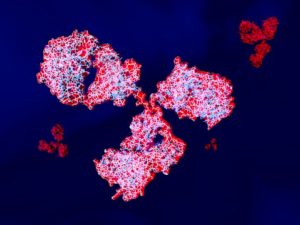Heparin-induced thrombocytopenia (HIT) is a severe complication of heparin treatment with significant risks of morbidity and mortality. HIT is caused by platelet-activating antibodies against complexes of platelet factor 4 and heparin. Although HIT patients have low levels of platelets, the risk of thrombosis is high and the use of other anticoagulants may increase the risk of bleeding. Since standard therapies are not always successful, a recent study investigated the use of intravenous immunoglobulin G (IVIg) in three patients with HIT who did not respond to standard therapies but experienced rapid improvement with IVIg treatment. Furthermore, platelet activation was inhibited by the constant domain (Fc) of immunoglobulin G (IgG), and it was found that certain genotypes of the platelet IgG receptor were more responsive to IVIg treatment. Further studies are needed to evaluate the risks and benefits of IVIg treatment for HIT patients.
Reference:

